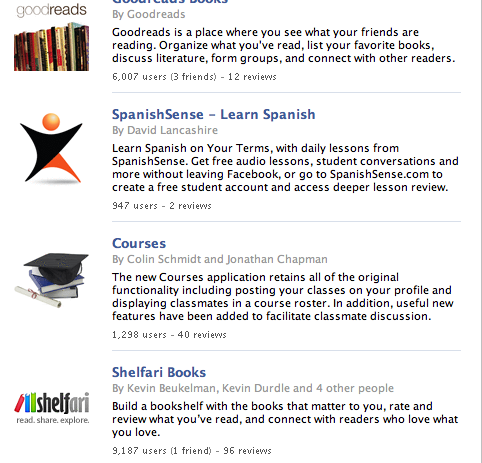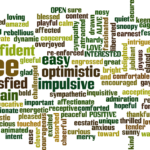Facebook dropped their “Courses” function. (To make sure new users knew they weren’t just a college focused site and to give developers a crack at what Facebook now considers a niche.)
Developers rush in:
Our assumption/prediction is that the Facebook application platform will eventually have a suite of apps for college students. There will be an “ecosystem” with a number of different apps handing data back and forth, supporting each other, each trying to solve some college student challenge.
The students outside of IT won’t care or notice while this goes on. They will just use what everyone else uses once something hits the tipping point.
Being the thing that “everyone uses” in college will be the holy grail for developers and just one reason why the apps will ban together in some sort of platform on a platform.
Most of these apps, Red Rover among them, are reliant on network effects for their utility. So they won’t be too useful with 2,000 and under users spread across 100 different networks. (This is the current state for the courses type apps.)
But if one college app can get traction, it will offer any other college apps the same incentive that attracts developers to the Facebook platform in the first place: users.
Maybe it won’t be a race with a clear leader, but instead, a bunch of small apps will combine their installed base to get to critical mass. Wouldn’t that be nice and friendly?
Eventually, this suite of web 2.0 apps working together will supplant Blackboard for small schools and then big schools too.
Maybe, just maybe, some of these tools will be picked up and used by the students before their schools even notice.
The suite will include:
Courses: matching, collaboration, sharing.
Student Activities: communicating, calendaring, polling
Digital Portfolio: a record of student’s work attached to digital identity.
Communication: filtered school communication, (e-mail doesn’t work anymore, the new thing solves this.)
Recommendation Engine: Other sophomores like you liked x class and x experience. Click here to sign up.
Assessment Modeling: peer reviews, advising, a whole new grading system that is learner centered, and deeply transparent.
There are already many companies and individuals with apps that fit into these categories running around. They’ll roll out and API up and we’ll see how it shakes out. It’s a very fertile ground for innovation in educational tools.
The hard part is making an education app viral (because education is just not as cool as pirates v. ninjas**). That’s why we believe there will be a college platform on the Facebook application platform. This will include a set of tools that work together to give the students a unified toolset with one login, and all data linked on the back end.
How this is priced as a suite. . . and who pays . . . we don’t have the foggiest. Except to say that Google is a given. And advertising will be all over it.
Our preference is to keep it advertising free. We don’t think advertising and education go together. That’s just us.
But will the schools be willing to be as creative with their funding as the developers will be with their approach and business models? We’ll see.
In the end, price points for functionality will come crashing down, and this will be a great thing for school budgets and students.




